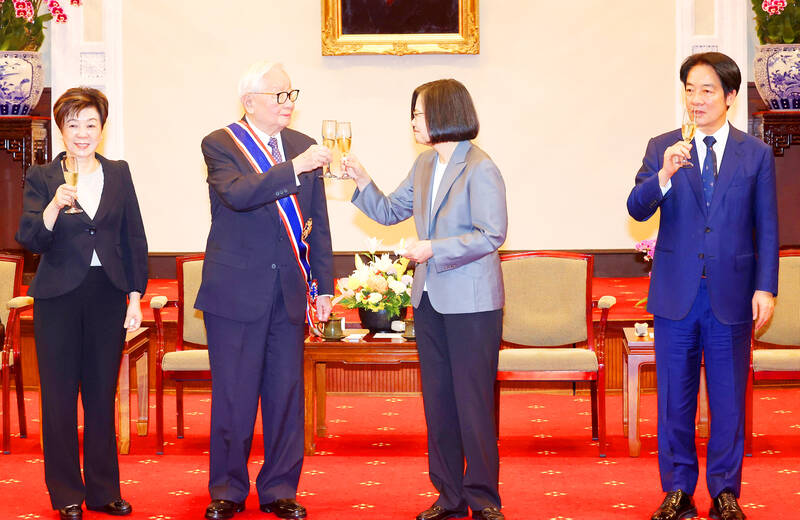Taiwan Semiconductor Manufacturing Co (TSMC) founder Morris Chang (張忠謀) received one of the nation’s highest medals of honor yesterday in recognition of his achievements as the founder of TSMC and envoy to APEC.
Known as the “godfather” of the nation’s chip industry, Chang founded TSMC three decades ago, building it into a multibillion-dollar company that today is a leader in making the microchips that power everything from smartphones to artificial intelligence.
The Order of Dr Sun Yat-sen is the highest honor the government can confer on a person who is not a head of state, President Tsai Ing-wen (蔡英文) said when she presented the medal to Chang.

Photo: Taipei Times
Describing the 92-year-old as a “great entrepreneur” and a “good friend,” Tsai thanked Chang for “letting the world see Taiwan with technology, innovation and enthusiasm.”
“Because of [TSMC] founder Chang, Taiwan’s semiconductor industry has become world-class,” Tsai said. “He is also committed to localizing the supply chain, leading the development of the ‘sacred mountain’ protecting Taiwan.”
Chang had also represented Taiwan six times at the APEC summits, most recently in San Francisco last year.
“As a leader’s envoy at the APEC, he let the world know Taiwan is a capable partner worthy of trust and cooperation, and let the world know the Republic of China (Taiwan) is a presence that cannot be ignored,” she said.
Chang thanked Tsai for the recognition, adding that his creation of TSMC “established a model of a world-class technology company in Taiwan, and made some contributions to Taiwan’s economic growth.”
TSMC was the miraculous aggregation of his personal desire to create a semiconductor company and the Taiwanese government’s willingness to support such firms, he said.
“I want to share the honor with everyone at TSMC,” he said, acknowledging the guests present at the ceremony who worked with him at TSMC before his retirement.
The company flourished during an era of free trade, but in recent years globalization has been facing challenges, he said, calling on TSMC’s leaders to exercise their wisdom to allow the firm to compete fairly in the world market.
He also urged the government and other sectors to work together to ease the challenges of land, electricity, water and talent shortages facing the industry.
Also present at the event were president-elect William Lai (賴清德), vice president-elect Hsiao Bi-khim (蕭美琴) and American Institute in Taiwan Director Sandra Oudkirk.
Besides Chang, two of Taiwan’s former vice presidents, Chen Chien-jen (陳建仁) and Annette Lu (呂秀蓮), received the order, which the Presidential Office described as “a token of thanks to those who make outstanding contributions to this country.”
In 2018 — the year Chang stepped down as TSMC’s chief executive officer — he was awarded the Order of Propitious Clouds for his part in developing the nation’s high-tech sector.
Additional reporting by CNA

Alain Robert, known as the "French Spider-Man," praised Alex Honnold as exceptionally well-prepared after the US climber completed a free solo ascent of Taipei 101 yesterday. Robert said Honnold's ascent of the 508m-tall skyscraper in just more than one-and-a-half hours without using safety ropes or equipment was a remarkable achievement. "This is my life," he said in an interview conducted in French, adding that he liked the feeling of being "on the edge of danger." The 63-year-old Frenchman climbed Taipei 101 using ropes in December 2004, taking about four hours to reach the top. On a one-to-10 scale of difficulty, Robert said Taipei 101

Nipah virus infection is to be officially listed as a category 5 notifiable infectious disease in Taiwan in March, while clinical treatment guidelines are being formulated, the Centers for Disease Control (CDC) said yesterday. With Nipah infections being reported in other countries and considering its relatively high fatality rate, the centers on Jan. 16 announced that it would be listed as a notifiable infectious disease to bolster the nation’s systematic early warning system and increase public awareness, the CDC said. Bangladesh reported four fatal cases last year in separate districts, with three linked to raw date palm sap consumption, CDC Epidemic Intelligence

Two Taiwanese prosecutors were questioned by Chinese security personnel at their hotel during a trip to China’s Henan Province this month, the Mainland Affairs Council (MAC) said yesterday. The officers had personal information on the prosecutors, including “when they were assigned to their posts, their work locations and job titles,” MAC Deputy Minister and spokesman Liang Wen-chieh (梁文傑) said. On top of asking about their agencies and positions, the officers also questioned the prosecutors about the Cross-Strait Joint Crime-Fighting and Judicial Mutual Assistance Agreement, a pact that serves as the framework for Taiwan-China cooperation on combating crime and providing judicial assistance, Liang

US climber Alex Honnold left Taiwan this morning a day after completing a free-solo ascent of Taipei 101, a feat that drew cheers from onlookers and gained widespread international attention. Honnold yesterday scaled the 101-story skyscraper without a rope or safety harness. The climb — the highest urban free-solo ascent ever attempted — took just more than 90 minutes and was streamed live on Netflix. It was covered by major international news outlets including CNN, the New York Times, the Guardian and the Wall Street Journal. As Honnold prepared to leave Taiwan today, he attracted a crowd when he and his wife, Sanni,